Silence
 for some disturbing violent content.
for some disturbing violent content.
Reviewed by: Jeremy Landes
CONTRIBUTOR
| Moral Rating: | Very Offensive |
| Moviemaking Quality: |
|
| Primary Audience: | Adults |
| Genre: | Historical-Fiction Drama Adaptation |
| Length: | 2 hr. 41 min. |
| Year of Release: | 2016 |
| USA Release: |
December 23, 2016 (limited—4 U.S. theaters) January 6, 2017 (expanded—747 theaters) DVD: March 28, 2017 |
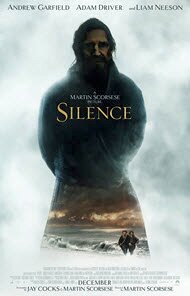


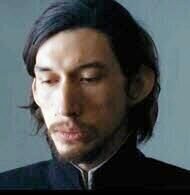

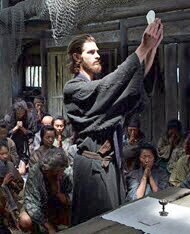
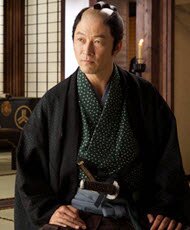
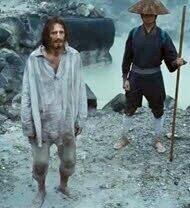
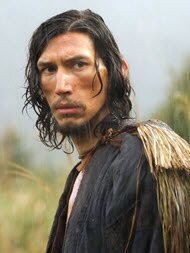

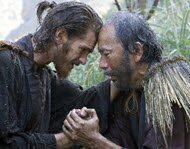
Crisis of faith
Who is Shūsaku Endō? Author of the novel on which this film is based, a Japanese Roman Catholic who died in 1996.
Who was Cristóvão Ferreira? An apostate Portuguese Catholic priest and Jesuit missionary. See Wikipedia article
Who is Giuseppe Chiara? An Italian Jesuit missionary, born in Spain, active in 17th century Japan, arrested in May 1643, died August 24, 1985. He was the historical basis for the character Sebastião Rodrigues in “Silence.”
religious persecution and discrimination
torture
lying and committing apostasy inorder to survive and/or help others survive, while keeping faith in private
compare martyrdom to eternal life and eternal death
hidden Christians in countries of extreme persecution
Will all mankind eventually be saved? Answer
What is a martyr? Answer
MISSIONARIES—Why send missionaries to other lands? Answer
MISSIONARIES—How can I pray for my missionary? Answer
How can followers of Christ best pray for Muslims? Answer
STORY ABOUT PRAYER—Hindus Pray to Jesus for their dead daughter
How can we know there’s a God? Answer
What if the cosmos is all that there is? Answer
If God made everything, who made God? Answer
Is Jesus Christ God? Answer
about Roman Catholicism
Jesuit priests
Why does God allow innocent people to suffer? Answer
What about the issue of suffering? Doesn’t this prove that there is no God and that we are on our own? Answer
Does God feel our pain? Answer
ORIGIN OF BAD—How did bad things come about? Answer
Did God make the world the way it is now? What kind of world would you create? Answer
WHY PRAY?—What’s the point of praying? Answer
| Featuring |
|---|
|
Andrew Garfield … Rodrigues Adam Driver … Garrpe Liam Neeson … Ferreira Ciarán Hinds … Father Valignano Tadanobu Asano … Interpreter Issei Ogata … Old Samurai / Inoue Shin'ya Tsukamoto … Mokichi Yoshi Oida … Ichizo Yôsuke Kubozuka … Kichijiro Kaoru Endô … Unzen Samurai (Uneme) See all » |
| Director |
| Martin Scorsese — “The Last Temptation of Christ” (1988), “The Wolf of Wall Street” (2013), “Gangs of New York,” “The Departed” |
| Producer |
|
Cappa Defina Productions CatchPlay See all » |
| Distributor |
During the 1600s, Japanese authorities cracked down on their people who confessed Christ as their Lord. It became illegal for Europeans to share their faith, and many people were killed because they would not back down from trusting Jesus, despite the heavy persecution.
“Silence” is the fictional story of two Jesuit priests from Portugal, Garrpe and Rodrigues (Adam Driver and Andrew Garfield), who dare to venture into Japan because one of their mentors, a priest/missionary named Ferreira (Liam Neeson) stopped writing home years ago and has reportedly recanted his faith to live as one of the Japanese. The younger priests set out to find and rescue him, in one of the most dangerous places in the world to be a believer.
While millions of people flocked to see Jesus suffering a violent death in “The Passion of the Christ” and were inspired by Jesus’ courage and sacrifice for humanity, Martin Scorsese’s “Silence” frames suffering for your faith in a different light. What if your choice to proclaim Christ and guide other people toward eternal salvation brings down the government’s wrath on new believers and their families? Could you justify allowing other people to suffer because you don’t want to risk your own damnation for dishonoring God?
A New Testament verse says, “If you deny Me (Jesus) before men, then I will deny you before the Father.” In this movie, priests and their persecuted Japanese followers are constantly being asked to choose between loyalty to the government or dishonoring God—symbolized by placing their foot upon an image depicting Jesus or spitting on a cross. When the Japanese refuse to yield, they are tortured in terrible ways, until death finally comes.
I will never forget the images of people slowly bleeding to death while hanging upside down or drowning over the course of several days, while they’re tied naked to crosses amidst the ocean’s waves beating down on them. Personally, I work for an organization that sends Christians to the world’s most dangerous countries, so that people can hear about Jesus for the first time and believe in Him. The risks for new believers can be very high, and I’ve learned about many people who have been killed because they would not forsake Jesus. Watching “Silence,” I was sobered by the fear that Christians felt and also the hope in their eyes while receiving Communion or baptism.
PERSECUTION—Why and how should we pray for suffering Christians? Answer
The movie doesn’t try to send a simplistic message, like, “Missionaries are ultimately responsible for persecution, so people would be better off if they stayed home.” But neither is the message simply, “Jesus is worth any and all suffering—His power overcomes everything.” The “silence,” referenced to by the movie’s title, probably represents many people’s experience when they cry out to God for help and aren’t able to hear Him answer. Many Christians will say they’ve never heard God speak to them audibly, and others may say He stopped speaking when the Bible was finished. Still others could come away from watching a movie like “Silence” concluding there is no God because, if He did exist and was as good as churches say He is, then He would do something to stop human suffering.
How can we know there’s a God? Answer
Why does God allow innocent people to suffer? Answer
What about the issue of suffering? Doesn’t this prove that there is no God and that we are on our own? Answer
Does God feel our pain? Answer
Did God make the world the way it is now? What kind of world would you create? Answer
Why aren’t my prayers answered? Answer
WHY PRAY?—What’s the point of praying? Answer
Why should humans give thanks to their Creator? What does the Bible say about it? Answer
The movie’s characters ask, “What does God want from me? Theological devotion to the Church or love for my fellow men?” As someone who’s part of the evangelical strain of 21st century believers, I struggled while watching this movie because the young priests led the underground church in Japan using Latin, which I doubt their listeners understood, and their followers also voraciously received tiny symbols of their faith, like rosary beads, as if they had divine power. I’m certain some of the practices in my own church would make believers 400 years ago very uncomfortable, too, so I won’t point my finger in judgment. Seeing this film, though, you may also have some concerns about the doctrine the priests attempt to deliver to the Japanese.
Americans viewers are also accustomed to watching a hero struggle, suffer, persevere, and eventually succeed in his or her quest as a changed person. However, the journey of Rodrigues, in particular, seems quite different, because he enters Japan confident in his faith and ready to let God use his life, but everything he thinks he knows about God and himself gets slowly stripped away until he understands what Jesus felt when He cried out, “My God, my God, why have You forsaken Me?” You may not agree with the choices this character makes or the kind of death he chooses to endure, but you may be able to empathize.
This is not a movie designed to entertain someone who wants to watch movie stars like Liam Neeson and Andrew Garfield (of “The Amazing Spider-Man” fame) win a victory for faith in Japan. It is sad, intense, and brutal. People who are not yet strong in their faith likely aren’t going to gain a lot from seeing the film, either. This movie is like a wrestling match, in which someone who thinks he’s an authority on God faces his own sin, doubts, failures, as well as the weaknesses of others, coming out the other side to find… well, I won’t ruin everything.
This is one of the most challenging films about faith I have ever seen, and I’m still struggling with questions it raised. If you go, be prepared to come back to the Lord and His Word with questions the movie raises for you. Hopefully, the Spirit inside you will not seem silent, but you’ll receive both comfort and conviction of sin. This is a unique movie that demands a lot of thought, and not everyone will be ready for it. Its violence is terrible.
Violence: Extreme / Profanity: None / Nudity: Moderate—loincloths, shirtless men, no sex
 Who is Director Martin Scorsese? American film director, screenwriter, producer. Faith: Identifies as a “lapsed Catholic.” Based on his his life actions and his beliefs, it appears that his faith is primarily Secularism with an emotional and family and cultural attachment to Catholicism. (He was raised in a strongly Roman Catholic family, and once wished to become a priest—attending a preparatory seminary, but failed after the first year.) He has married 5 times and divorced 4 times. Worldview: Progressive Liberalism.
Who is Director Martin Scorsese? American film director, screenwriter, producer. Faith: Identifies as a “lapsed Catholic.” Based on his his life actions and his beliefs, it appears that his faith is primarily Secularism with an emotional and family and cultural attachment to Catholicism. (He was raised in a strongly Roman Catholic family, and once wished to become a priest—attending a preparatory seminary, but failed after the first year.) He has married 5 times and divorced 4 times. Worldview: Progressive Liberalism.
He directed “The Last Temptation of Christ,” a very Liberal 1988 film strongly criticized by many Christians. It portrays a Jesus (Willem Dafoe) who does not understand who He is, and is surprised he can perform miracles. He watches Mary Magdalene (depicted as a prostitute by Barbara Hershey) have sex and makes advances to her. Jesus “leads a small army to capture the temple by force.” He persuades Judas to give him to the Romans, against Judas’ wishes. “While on the cross, Jesus converses with a young girl who claims to be his guardian angel. She tells him that…he is not the Messiah, and that God…wants him to be happy. She brings him down off the cross and, invisible to others, takes him to Mary Magdalene, whom he marries. They are soon expecting a child and living an idyllic life; but she abruptly dies, and Jesus is consoled by his angel; next he takes Mary and Martha, the sisters of Lazarus, for his wives. He starts a family with them, having many children, and lives his life in peace.” The Apostle Paul is depicted as a preacher who willingly deceives people into believing that Jesus died on the cross and was resurrected from the dead.
Scorsese’s longtime editor Thelma Schoonmaker has said that “Silence” is “part of a spiritual trilogy of sorts with ‘The Last Temptation of Christ’ (1988) and ‘Kundun’ (1997).
Scorsese has made some exceedingly offensive films during his career, including “The Wolf of Wall Street” (2013), “Gangs of New York” (2002), “Shutter Island” (2010), and “The Departed” (2006)
See list of Relevant Issues—questions-and-answers.


Moral rating: Good / Moviemaking quality: 5
In many ways it did not disappoint. It is a movie about subjects not often dealt with in film: Jesus, his church, taking risks, persecution and doubt. It opens with two young priests desiring to find a Jesuit priest gone missing in Japan; rumors are he has apostatized. The young priests take upon themselves the task of quenching those rumors by finding him. Their quest becomes a journey of discovery.See all »
Moral rating: Good / Moviemaking quality: 5
I write from evangelical point, so your mileage may vary. First, there is huge difference between well educated faith of priests and simple yet genuine faith of Japanese villagers. I would say that this contrast wasn’t primary purpose of the movie, yet it shows us important trait. Knowing is good, but doing in faith is far more important than knowing exactly all details. Real heroes are Japanese villagers who are faithful till the bitter end. And there are many these. This shows the inspiring value of faith and the raw Christianity as was in first century.
Quite omitted is part of priest Garrpe. He is at the beginning the one who is less enduring, more fearful and bit legalistic. Yet his time with villagers is used and in very brief moment it is shown that he matured in faith. When fellow villagers are put to death he is sacrificing his life in attempt to save them. This is also inspiring. It shows that educated, physically weak and fearful westerner could become hero of faith with mercy of Jesus Christ and help of more mature believers. Generally any of us could stand in such position. This is my hope from this film. See all »
Moral rating: Offensive / Moviemaking quality: 4
Interestingly, the film tries to side-step this question by asking the viewer to also consider, ‘what if your denial is not sincere?’ The director further compounds the choice by presenting situations where lives would be saved ‘only if the priests denounce their faith.’
Jesus, knowing the coming persecutions and the societal pressure to deny Him, addressed this when he taught that He must come first above all other considerations. “If anyone comes to me and does not hate father and mother, wife and children, brothers and sisters—yes, even their own life—such a person cannot be my disciple.” —Luke 14:26
As for the ‘sincerity’ of one’s denying Jesus in public, the Japanese inquisitor’s right-hand man told the priests that he did not care if they continued to believe in Jesus or not, and that stepping on the image of Christ was a ‘mere formality’ in order to save themselves and other Christians.
This insincere formality reminds me that there is coming a time, some would say soon, when the anti-Christ will make himself known and force all, including believers, to take the ‘mark’ of the beast (Revelation 13:16-17) denying our Lord Jesus in the process. Those faced with this choice need to know that there is no hope of escaping God’s wrath if they do.
“…If anyone worships the beast and its image and receives its mark on their forehead or on their hand, they, too, will drink the wine of God’s fury…” —Revelation 14:9-10Director Martin Scorsese has no real understanding of genuine faith or repentance, as evidenced also by the near comical way one character professed and then denounced the faith time and time again. By the end of the film we see the fallen, faithless one’s give a minuscule nod to their ‘still living,’ but secret, faith, but it only comes across as patronizing lip service to the Christian faith, as Scorsese understands it. The earlier portion of the film that shows the true faith of the Japanese converts cannot outweigh the apostasy that is the rest of the film, and I strongly encourage all to avoid this travesty.
Moral rating: Very Offensive / Moviemaking quality: 3½
A question that Scorcese does not answer is: what happens when, for whatever the reason, we give in to a tyrant’s demands? Doesn’t that encourage the tyrant’s resolve and ensure that his cruel techniques persist? Scorsese seems to say that giving in to tyranny is sometimes, maybe always, the only choice. Do we need to review Japan’s or the rest of the world’s history to refute such an argument? Should we meet the demands of evil doers in order to mollify them and to avoid their threats?
Let’s be clear. The Jesuit hero of the story makes no choice. He has it both ways. What he truly believes is as clear as the clouded landscape of the film’s coastal setting. His logic is as misty as the Japanese skies. The priest does a disservice to both Buddhism and Christianity. Say what you will about either religion; neither is as lukewarm as is portrayed here. At least the scraggly Judas—like character who constantly betrays his faith, his people and himself keeps coming back. In fact, he runs back. He knows he is a wretch and that only God can save him.
The final scene is a cop-out; the hidden bamboo cross will be the first thing that disintegrates in those Buddhist flames. The film ends with a fire; it’s a shame that such a long film never manages to light a spark, let alone catch fire.
Moral rating: Average / Moviemaking quality: 2
I went to “Silence” with a devout Catholic, hopeful of finding something good in the movie, due to enthusiastic reviews. At the slow beginning, beautiful scenery and Christian sentiments abound as two young priests arrive, looking for an older one thought to be missing. Even when persecution begins, there are moving, beautiful, and poignant scenes of Christians sacrificing their lives for love of Christ (enough to make believers weep). Yet soon the deception begins.
Gradually, as the persecution grows, there are less and less scenes of devotion and more of failure, apostasy, dead bodies, and vocal doubt on the part of the younger priest, who begins speaking in terms like, “if God hears” or “if he is really there.” There are worse questions to come, intended to confuse the faith of anyone who has not thought persecution through on a deep level (which probably applies to most Americans).
After his partner dies, the same young priest is then tempted (like the older one they came to find) by the fact that his faith will cause others to be tortured, as the Japanese discovered the method most effective in making priests into apostates. Still, the notion of torturing lay Christians to get pastors to commit apostasy is not new, though the movie dwells on it in such a special way that one wold think it had never happened anywhere before. In fact, it has always been one of the most common methods of persuasion. As is the notion of torturing family to make parents commit apostasy. See all »
Moral rating: Extremely Offensive / Moviemaking quality: 4
Moral rating: Extremely Offensive / Moviemaking quality: 3
I understand the cruelties that Japan put Christians through, but I also know the early church dealt with these same issues. The problem is that Scorsese promotes the idea that it is “Christian” to be silent about our faith. We are told that God is silent, and apparently so should we be. This movie borders on blasphemy, but it is made by the same man who brought us “Last Temptation of Christ.”
Moral rating: Very Offensive / Moviemaking quality: 3
I was skeptical when I saw that Liam Neesen was in it, because I felt the same way at the end of the movie “The Grey,” but decided to give it another chance. Feel cheated that I did. Won’t happen again Liam. There is nothing about these two movies that could lead you to believe that he is a Christian.
We went expecting to see a movie about two Christian Missionaries who go to minister to the Japanese people and win souls for Jesus. The theme of the movie is definitely all about God remaining silent and not being there for any of the people who believe in Him and put their faith in Him. Cowardice and betrayal win out over faith and redemption. Too bad. Waste of $20.00 and two hours and 39 minutes.
Moral rating: Extremely Offensive / Moviemaking quality: 5
The priest whose dead body holds a bamboo crucifix is supposed to represent that he never turned away from Christ; he simply stopped representing him. Good for him. Warm and fuzzy, and, ultimately, I guess, a sign of persistence of faith. But it is also, quite literally, “hurray for me and to hell with everybody else.”
If the message of the Gospels is correct, this movie dismisses those souls that were lost because the fathers lived on in Japan as symbols of a rejection of their own faith; native Japanese around them either never hearing about Christ, or ignoring it because they saw its rejection by these priests. The act of apostasy, stepping on a picture of Christ or the cross, might resonate with Catholics. For Protestants, however, we try to avoid idolatry; the stepping on a picture of any kind would have no spiritual meaning. See all »
Moral rating: Extremely Offensive / Moviemaking quality: 4
PLEASE share your observations and insights to be posted here.
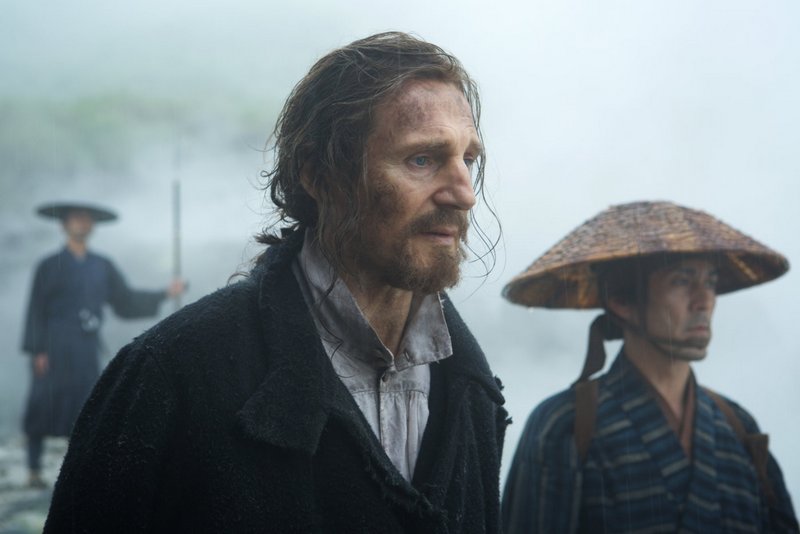




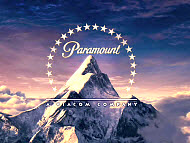
The 2nd half is full of dread as we witness a Jesuit Priest realize he is not prepared to watch the Japanese Christians suffer for him as the Japanese inquisitor puts it. It raises some interesting questions, in my opinion, like if the Japanese have distorted the gospel through culture lens or translation and believe Jesus is the physical sun, are they being martyred for their faith or for the Priest’s vision of a Christian Japan, and, if it is the latter, is that a selfish vision? See all »
My Ratings: Moral rating: Average / Moviemaking quality: 5